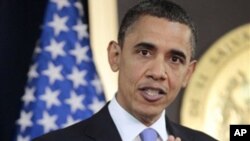President Barack Obama goes before the American people late Monday (at 23:30 UTC) to explain his decisions, and objectives that the U.S., its international partners and NATO have in Libya. Our correspondent reports on what the nation and the world are likely to hear from the president.
NATO is already formally in charge of enforcing the no-fly zone over Libya, and carrying out the United Nations-mandated humanitarian mission of protecting Libyan civilians from forces loyal to Moammar Gadhafi.
After a key meeting of U.S. and international partners, including the Arab League, in London, NATO will also assume full control of command and control of Libya operations.
But in terms of public opinion at home, President Obama still has some explaining to do, and will use his address to provide the specificity that critics in Congress and elsewhere have asserted he has failed to deliver.
The president is not expected to say much that is new in his speech from a military education institution in Washington, the National Defense University. He is likely to review the recent history of United Nations Security Council resolutions that preceded military action. He will also re-emphasize that U.S. ground troops are not and will not be involved.
Mr. Obama will also stress what he and advisers have said from the beginning, that international action averted a humanitarian catastrophe in the face of Gadhafi's threats to exact revenge against rebels or anyone supporting them.
In an off-camera briefing for reporters, Deputy National Security Advisor, Denis McDonough, and Press Secretary Jay Carney declined comment on the specific contents of Mr. Obama's address.
Pressed by reporters as to what he will say about overall objectives and interests, McDonough referred reporters to remarks Secretary of State Hillary Clinton, and Defense Secretary Robert Gates made in television news shows over the weekend.
Gates had this response when asked on NBC's Meet the Press about whether the U.S. has a vital interest in Libya.
"No I don't think it is a vital interest for the United States, but we clearly have interests there, and it is a part of the region which is a vital interest to the United States," said Gates.
Asked whether the London conference will send a "last chance" message to Gadhafi, McDonough said the gathering will spell out and amplify an "end state and vision."
He declined a substantive response when asked about the Arab League statement Monday calling for a halt to military operations to clear the way for a political solution in Libya. McDonough said the London conference will provide an opportunity to discuss that.
White House officials downplay any significance media are attaching to the timing of Mr. Obama's speech, which occurs outside of normal prime time television viewing hours, or its delivery outside of the Oval Office.
Press Secretary Carney said the president will communicate what Carney called some of the "complexity" involved, and answer questions that members of Congress have been asking about the basis of his decisions.
Asked if Mr. Obama will aim any remarks in his speech directly at opposition voices in Libya, Carney declined again to preview the contents of the address.
The president's spokesman was also asked about the joint declaration on Monday by British Prime Minister David Cameron and France's President Nicolas Sarkozy, in which they appealed directly to Gadhafi loyalists to withdraw their support.
Broadly speaking, said Carney, the president has made clear that he thinks Libya deserves a new beginning and that Colonel Gadhafi is no longer a legitimate leader of Libya - in the eyes of his people and in the eyes of the world.





